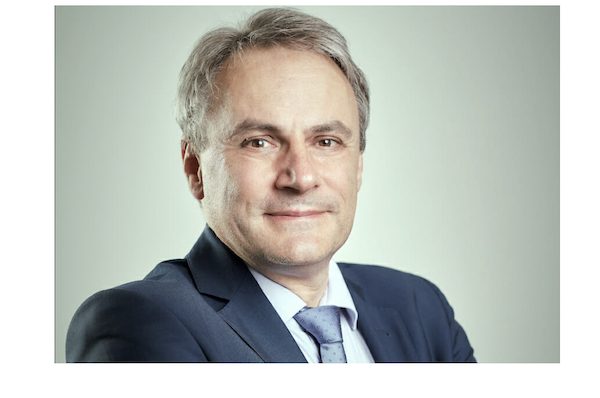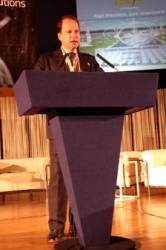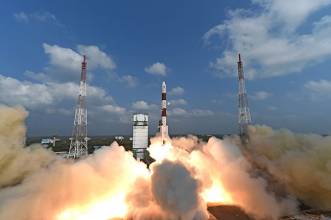An interview with Pascal Claudel, EUSPA chief operating officer. The European GNSS Agency (GSA), has evolved into the European Union Agency for the Space Program (EUSPA), with an expanded mandate and new responsibilities, aimed at furthering Europe’s wider ambitions in space.
Under a newly adopted EU Space Regulation, the GSA has become EUSPA, maintaining all of its previous responsibilities for managing the exploitation of Galileo and EGNOS, including service provision and operational security. But EUSPA will now also coordinate user-related aspects of the Union’s Governmental Satellite Communications (GOVSATCOM), in close collaboration with other concerned entities, and it will promote downstream and combined applications based on Galileo, EGNOS and the Union’s earth observation program, Copernicus.
Pascal Claudel is the former GSA acting executive director and now EUSPA chief operating officer. We asked him to talk about the new agency and its work. “As we go more and more towards a full operational system with Galileo,” Claudel said, “we have to reinforce the management of its exploitation through a clear line of command, as proposed by the new agreement. This allows us to better organize the work between EUSPA and the European Space Agency [ESA]. The previous governance model, established in 2016, was suited to a system in development. Now, it is logical to put in place a new governance structure, with the political decision maker remaining the European Commission.”
“Inside the Agency, we are optimizing our resources through a more cross-cutting approach,” Claudel said, “gathering competences from all programs and integrating the new activities, like GovSatCom and Copernicus. The mission of the Agency is to provide citizens, professionals, governments and institutions with reliability, accuracy and availability, 24/7, while taking into account our users’ specific needs.”
There are four tasks of particular importance to the Agency, he said, the first and foremost of these being to ensure the continuity of Galileo and EGNOS services, including the security of signals and infrastructure. The second key task is supporting the use of space data, specifically among SMEs, and, more generally, working to promote the penetration of EU data products within the market.
EUSPA sees data generated through space-based activities as indispensable to all Europeans, starting with the simple act of using a smartphone. A growing number of industries and entrepreneurs are using space-based data to create new opportunities, business cases and revenue streams. EUSPA works to communicate, promote, and develop the market for services offered by the European Union’s space programs.
New services on the way
Thirdly, there is the implementation of new services. Claudel said he expects the OSNMA, the Galileo message authentication service, to be ready in 2023. To this end, significant technical developments have been achieved in the past year and a public testing phase is in preparation.
The Galileo High-Accuracy Service (HAS), he said, will be ready shortly thereafter. The HAS is to be an open-access and free-of-charge service, based on the provision of precise corrections transmitted by the Galileo E6 signal from a subset of the Galileo satellites, enabling users to achieve improved ranging and positioning performance. On 18 May 2021, Galileo started testing specific aspects of the HAS service. The robust and secure Galileo Public Regulated Service (PRS), will of course remain available to governments and authorized partners.
“The new Galileo services will ultimately support advances in autonomous vehicles, smart cities, civil security and other government initiatives,” Claudel said. “With these services on the market, and by maximizing the synergies between Galileo, EGNOS, Copernicus and GovSatcom, we will be able to provide a 100% EU product, and we will increase the resilience of the EU and its autonomy.”
The last but not least important item on the EUSPA’s daily agenda is the implementation of the new agreement aimed at reinforcing the robustness of the exploitation of and synergies among all EU space programs. “To succeed we need to work as a whole, with the European Commission, ESA, operators and industry,” said Claudel. “In order to achieve the best operating mode and interaction between everyone, we have to have a clear sharing of tasks and responsibilities. Today we have all competencies inside the EU, but we have to continue to better optimize them and to foster the EU consortia, upstream and downstream.”
Adieu GSA
The European GNSS Agency will be remembered for its historic role in overseeing the European GNSS programs through their fledgling years, through the building of the constellations, the declaration of services and the development of a credible users’ market. The GSA performed its work with professionalism, energy and panache. Now, the GSA lives on in the EUSPA, its staff forming a strong core within the new Agency, which will expand as it takes up new responsibilities.
“The EUSPA team is a huge asset,” Claudel said. “Our staff is young and very motivated. During my time as interim GSA Executive Director, from February to October 2020, the Agency succeeded in the primary task of guaranteeing continuity of Galileo and EGNOS services, throughout the COVID-19 health crisis, delivering all the necessary support services to industry and SMEs.” Notably, the GSA supported the Commission’s Green Lane initiatives, developing a Galileo-based system that made it easier for essential transport traffic, including critical food shipments, to cross EU borders without hindrance.
The Agency also continued to move forward in its support of research and development projects and business start-ups, evaluating hundreds of proposals and awarding new funding to applicants from 22 EU countries through the Union’s Horizon 2020 framework program. “At the same time we successfully launched the OSNMA testing phase,” he said, “a key step towards service declaration. And we launched a similar testing phase for the PRS, with the involvement of all of our EU members states. And finally, we established a new Galileo Security Monitoring Center [GSMC] in Spain, so we now have two GSMC’s in operation.”
As people and organizations look for a fresh start in 2021, EUSPA appears ready to make its mark, as the new guiding force behind Europe’s GNSS and other space initiatives. So far, so good.






